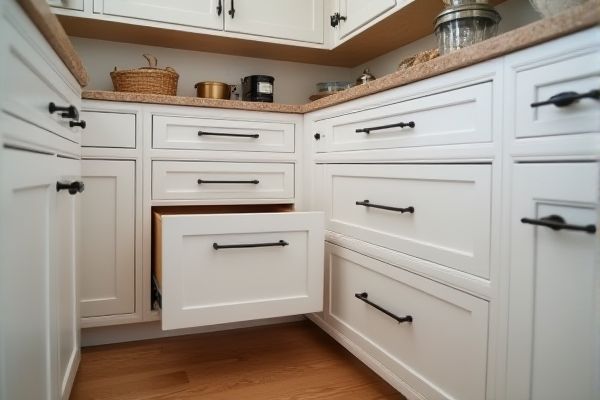
Soft-close pantry drawers offer a quiet and smooth closing mechanism that prevents slamming and reduces wear, enhancing the overall durability of your kitchen storage. Explore the rest of the article to discover how these benefits compare practically to regular drawers for your home.
Table of Comparison
| Feature | Soft-Close Pantry Drawers | Regular Drawers |
|---|---|---|
| Closing Mechanism | Soft-close hydraulic or dampened system | Standard slide or friction-based |
| Noise Level | Quiet, minimizes slamming | Loud, prone to slamming |
| Durability | Higher due to shock absorption | Moderate, more wear over time |
| Maintenance | Low, fewer mechanical issues | May require frequent adjustments |
| Cost | Higher upfront investment | Lower initial cost |
| User Experience | Smooth operation, enhanced convenience | Basic function, less smooth |
| Safety | Reduces finger pinching | Higher risk of injury |
Introduction to Pantry Drawer Options
Soft-close pantry drawers offer a sleek, quiet alternative to regular drawers by using advanced dampening technology that prevents slamming and reduces wear. These drawers enhance kitchen functionality and longevity by ensuring smooth, controlled closing motions, which protect contents and drawer integrity. Choosing the right pantry drawer system can optimize your kitchen's efficiency and contribute to a more enjoyable cooking experience.
What Are Soft-Close Pantry Drawers?
Soft-close pantry drawers feature a specialized mechanism that ensures drawers close smoothly and quietly without slamming, preventing damage and reducing noise in your kitchen. These drawers use hydraulic or pneumatic dampers to control the closing speed, enhancing durability and maintaining organized storage. Compared to regular drawers, soft-close options provide a more refined and hassle-free user experience for your pantry.
How Regular Pantry Drawers Work
Regular pantry drawers operate using simple metal or plastic runners that allow the drawer to slide in and out manually. These drawers rely on your control to prevent slamming, often resulting in noise and potential wear over time. Without a soft-close mechanism, regular drawers lack the gentle, cushioned stop that protects your pantry organization and extends the drawer's lifespan.
Key Differences Between Soft-Close and Regular Drawers
Soft-close pantry drawers feature hydraulic mechanisms that slow the drawer's closure, preventing slamming and reducing wear on both the drawer and its contents. Regular drawers lack this damping system, closing abruptly and often causing noise and potential damage over time. The smooth, controlled closing action of soft-close drawers enhances longevity and user experience, making them preferable for high-traffic kitchen areas.
Durability and Lifespan Comparison
Soft-close pantry drawers feature advanced damping mechanisms that reduce impact stress and wear, significantly extending their durability compared to regular drawers. Regular drawers often experience quicker degradation due to frequent slamming and lack of shock absorption, resulting in a shorter lifespan. Investing in soft-close pantry drawers enhances your kitchen's longevity by minimizing mechanical damage and maintaining smooth operation over time.
Noise Reduction: Soft-Close vs Regular
Soft-close pantry drawers significantly reduce noise by using hydraulic dampers that gently slow the drawer's movement, preventing loud slams common with regular drawers. This technology enhances kitchen tranquility, especially during early mornings or late nights. If you prioritize a quieter kitchen environment, soft-close drawers offer a marked improvement over traditional models.
Safety Features and Child-Friendliness
Soft-close pantry drawers offer enhanced safety features by preventing sudden slams and minimizing finger injuries, making them ideal for households with young children. Unlike regular drawers, soft-close mechanisms ensure a gentle, controlled closing motion that reduces noise and accidental pinching hazards. Your kitchen becomes a safer environment with these child-friendly drawers, promoting worry-free access and use.
Installation and Maintenance Requirements
Soft-close pantry drawers require more precise installation with specialized hardware to ensure smooth closing and prevent slamming, which may take extra time compared to regular drawers. Maintenance for soft-close mechanisms involves occasional lubrication and careful adjustment to avoid wear and maintain functionality, while regular drawers are simpler with fewer moving parts and easier upkeep. Your choice depends on balancing the ease of installation and minimal maintenance needs against the benefits of quieter, controlled closing.
Cost Analysis: Soft-Close vs Standard Drawers
Soft-close pantry drawers typically cost 20-30% more than standard drawers due to advanced hydraulic or damping mechanisms. While the initial investment is higher, soft-close drawers reduce wear and tear, potentially lowering long-term maintenance expenses. You can balance upfront costs with enhanced durability and smoother operation, making soft-close options cost-effective over time.
Which Pantry Drawer Type Is Best for You?
Soft-close pantry drawers offer enhanced convenience and protection by preventing slamming, reducing noise, and extending the lifespan of your cabinetry. Regular drawers are often more affordable and simpler in design, making them suitable for budget-conscious choices or less-frequent use areas. Your decision hinges on prioritizing long-term durability and comfort or initial cost-efficiency and straightforward functionality.
 homyna.com
homyna.com